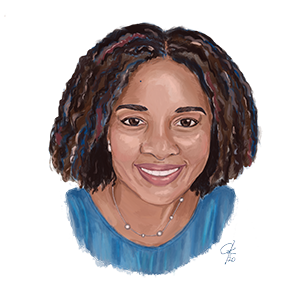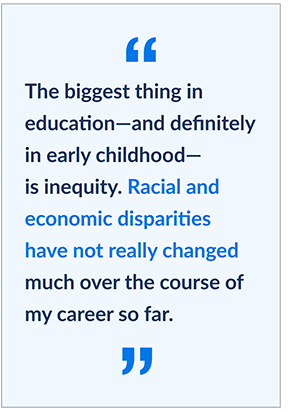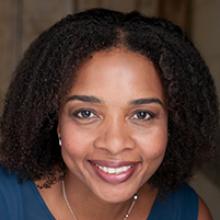Meet the Expert: Eboni Howard
 Eboni Howard, Ph.D., is a nationally recognized expert in child and family development, implementation science, and mixed-methods evaluation approaches. She has led a variety of studies and technical support projects on such topics as early childhood systems change, Quality Rating and Improvement Systems, and professional development.
Eboni Howard, Ph.D., is a nationally recognized expert in child and family development, implementation science, and mixed-methods evaluation approaches. She has led a variety of studies and technical support projects on such topics as early childhood systems change, Quality Rating and Improvement Systems, and professional development.
POSITION: Managing Researcher
AREAS OF EXPERTISE: Early Childhood and Child Development
YEARS OF EXPERIENCE: 28
Q: Why is it important to study and evaluate early childhood programs?
Eboni: Children are our most precious commodity. Early childhood programs and services can help with that. This is the reason we do what we do: evaluate programs to determine whether they’re making an impact on young children to enable them to grow up healthier and stronger and figure out ways to improve these programs. For example, I'm currently working with states and local entities on improving and evaluating their early childhood education system-building initiatives, such as the Preschool Development Grants and with the George Kaiser Family Foundation's Birth through Eight Strategy for Tulsa (BEST).
Q: What are some key features of high-quality early childhood education and care programs?
Eboni: We tend to classify key features into two categories: structural and process.
Structural features are things like class size, safety issues, and classroom organization. Smaller child-teacher ratios—more adults per children in the classroom—allow young children to have meaningful interactions and connections with the adults. Ensuring the building is clean and hygienic, that it has running water for example, is important. It’s also important the classroom is organized and set up in a way that facilitates learning, play, and engagement.
Key process features include human-to-human interactions in the space, such as how the adults talk and listen to the children. We also like to see positive interactions in how the children relate to each other.
Q: What does the research say about the effects of high-quality early childhood education and care on later educational and life success?
 Eboni: Early childhood education, specifically preschool for 3- and 4-year-old children, is where we have the strongest evidence. If children experience quality early education, research has shown that they have a bigger leg up on both short- and long-term academic success and even longer-term positive outcomes 40 or 50 years later. Cost-benefit analyses have shown that effective early learning and care ultimately decrease the amount of money spent in relation to special education support, juvenile justice, homelessness, and other similar systems.
Eboni: Early childhood education, specifically preschool for 3- and 4-year-old children, is where we have the strongest evidence. If children experience quality early education, research has shown that they have a bigger leg up on both short- and long-term academic success and even longer-term positive outcomes 40 or 50 years later. Cost-benefit analyses have shown that effective early learning and care ultimately decrease the amount of money spent in relation to special education support, juvenile justice, homelessness, and other similar systems.
Three studies are considered foundational in preschool effectiveness research: The Perry Preschool Study, the Carolina Abecedarian Project, and the Chicago Longitudinal Study. All three were longitudinal randomized controlled trials and together, they show the possibility of the major impact early childhood care and education can have on people’s long-term wellbeing. They established the basis of how we think about early childhood education quality and expected outcomes. HighScope, one of the organizations behind the Perry Preschool, really started defining what quality looks like in preschool. There have been several studies since that expanded and informed our knowledge base about the effects of high-quality early childhood education.
Q: What do you wish you’d known before entering this profession that you had to learn yourself along the way?
Eboni: Probably that I wouldn’t get to see young children very much being an early childhood researcher. Being successful in your career, you tend to get distanced from the little kids that brought you to the field to begin with. I miss that.
The other thing I wish I’d learned, and I’m still struggling with this, is that quality evidence and data are not always enough to make changes. The biggest thing in education—and definitely in early childhood—is inequity. Racial and economic disparities have not really changed much over the course of my career so far. And we’ve had data showing these inequities for more than 50 years. Making the changes that evidence shows could benefit all children is complex, wrapped up in politics and finance.
Q: What trends or topics in early childhood education and care should people pay attention to over the next five to 10 years?
Eboni: For researchers, we’re moving toward developing better measures of early childhood development outcomes and quality in early care programs. That includes quality measures for the diversity of child outcomes that go beyond just academic achievement in literacy, language, and math.
For practitioners and policymakers, it is critical to focus on the early childhood education and care workforce. It costs a lot of money to provide services to young children, whether it’s early learning, home visitation, early intervention—there are a lot of services under the early childhood education umbrella—and families are paying that money. But that doesn’t mean the providers or workforce is getting it. Depending on the state, many of those working in childcare are getting paid $9-$10 an hour. This can impact the level of education these caregivers can attain, the support they receive, and the professional development they have access to.
There’s also a really big gap in supporting families to pay for childcare and support services. Families are paying anywhere from 30 percent to 50 percent of their income to have their children in early care. This is something we as a country need to pay more attention to moving forward.
Q: What book do you think everyone should read and why?
Eboni: There Are No Children Here by Alex Kotlowitz. It’s a nonfiction story of two boys growing up in the Henry Horner Homes, a public housing complex in Chicago. The boys in the story are both under 12 years old, and their families are trying to make a good home without economic resources in decaying public housing. Reading that story made me think, “Gosh, how can you let children grow up like this?”
Everyone should read this book because a lot of people making decisions about early childcare and education—advocates, funders, politicians—are so distanced from what it’s like to not have food, what it’s like to eat government cheese, what it's like to have brown skin. I remember as a kid eating government cheese and Wonder Bread sandwiches. I know what it's like to feel like you've grown up in a different world from the majority of people in financial and political power. Reading this book really helps you stay grounded.
Q: What do you do outside of work?
Eboni: On the weekends, you can typically find me spending time with my daughter and doing yoga, teaching yoga, or training other people to become yoga instructors.
About 10 years ago, I spent my free time doing improv comedy at Second City in Chicago. I wasn’t on the main stage but did perform in the smaller theaters. When I moved to Washington, D.C., to start at AIR, I eventually gave it up, but it’s still a helpful skill to have when doing presentations.
